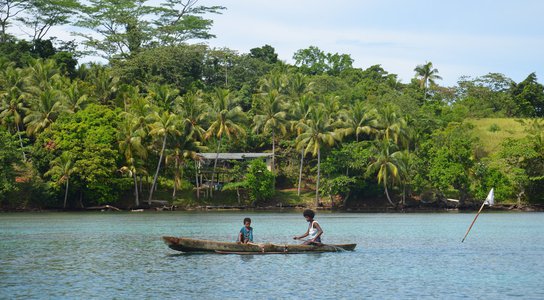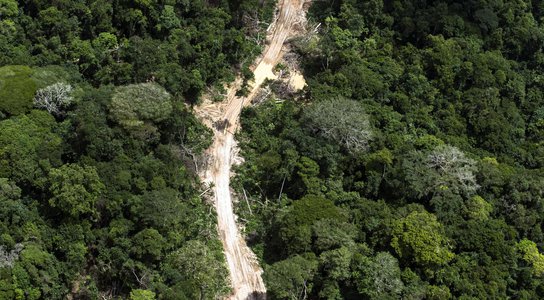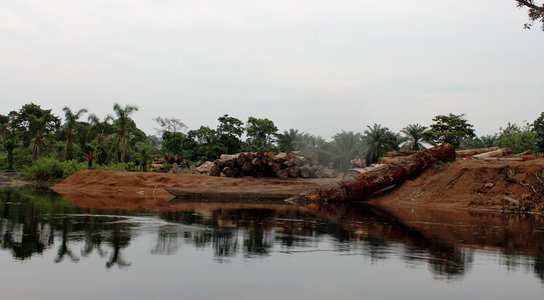Global Witness calls on the Central African Forests Initiative[1] (CAFI) and its members to ensure strict conditions and safeguards in its new U$65 million partnership agreed this week with the government of the Republic of Congo.
In April 2019, the government of the Republic of Congo authorized drilling in the Ngoki oil block by issuing an environmental conformity certificate to the operators[2]. 64% of this oil block is in peatland – an environment which, if damaged, is well known to be a major source of greenhouse gas emissions[3].
By authorizing oil exploration or any type of peatland exploitation, we believe that the government of the Republic of Congo is already undertaking actions which could undermine CAFI's objectives[4] and call into question its commitment to support REDD+[5] and to the Paris Agreement[6] to fight climate change.
Global Witness is concerned that current provisions in the Letter of Intent[7] are not sufficient and could legitimise mining and oil exploration in the peatland. We therefore urge CAFI to strengthen the guarantees and conditions agreed between the two parties to ensure the effective protection of the forest and the peatlands in the Republic of Congo.
The Congo Basin forests are the second biggest rainforest in the world and are home to the recently discovered second largest tropical wetland spanning both the Republic of the Congo and the Democratic Republic of Congo. The peatland is estimated to contain 30 billion tons of carbon – the equivalent of nearly 3 years of global emissions according to CAFI itself. The Congo’s peatland is facing immediate risks of deforestation and land use change, which constitute significant threats to these forests and the global climate[8].
Global Witness has repeatedly exposed evidence of apparently corrupt practices and money laundering involving the Congolese President Sassou-Nguesso’s family and inner political circle[9]. These revelations are symptomatic of serious governance issues in the Republic of the Congo.
In this context, CAFI should ensure strict conditions and effective safeguards to protect the peatland before disbursing any funding to the Republic of Congo. These conditions should include the immediate cancellation of all oil blocks in or around the peatland, and a ban on all current and future industrial activity (logging, agribusiness, mining, oil) and infrastructure projects in or around the Congo Basin peatland.
CAFI must also seek the guarantee from the Congolese government of high-level political commitment to the rule of law, transparency and participation of civil society in the protection of the country’s forests.
CAFI should ensure it learns from its experience in the neighbouring Democratic Republic of Congo, where plans to back an expansion of industrial logging were subject to controversy[10]. The body must ensure that its programmes are in no way associated with the expansion of industrial activity in the Congo Basin rainforest and do not undermine global efforts to combat climate change.
[1] The Central African Forest Initiative (CAFI) was formally launched on 29 September 2015 at the margins of the United Nations General Assembly in New York. It is an initiative of the Norwegian Ministry for Climate and Forests, in collaboration with other donors, including France, Germany, the European Union, South Korea, the Netherlands and the United Kingdom, who committed to protect the Central African forest through financing and supporting the REDD+ process.
REDD+ main goal is to reduce forest emissions and enhance carbon stocks in forests.
In a joint declaration CAFI members committed ‘to recognise and preserve the value of forests in the region to mitigating climate change, reducing poverty, and contributing to sustainable development’. Partner countries, including the Republic of Congo, specifically committed to a ‘transformational change to reduce emissions from deforestation and forest degradation’ http://www.cafi.org/content/cafi/en/home/our-work/governance/the-cafi-declaration.html
[2] http://www.cafi.org/content/cafi/fr/home/all-news/republic-of-congo-and-cafi-sign-65-million-dollars-letter-of-int.html
[3] http://www.sgg.cg/JO/2019/congo-jo-2019-17.pdf (p. 335)
[4] https://www.iucn.org/resources/issues-briefs/peatlands-and-climate-change
[5] http://www.cafi.org/content/cafi/en/home/our-work/governance/the-cafi-declaration.html
[6] REDD+ main goal is to reduce forest emissions and enhance carbon stocks in forests. More here.
[7] The Republic of Congo committed to 48% conditional emission reduction compared to the trend scenario by 2025 and to 55% by 2035. https://www4.unfccc.int/sites/submissions/INDC/Published%20Documents/Congo/1/INDC_Congo_RAPPORT.pdf
[8] LoI between CAFI and Republic of Congo p.27, Annex 1, ‘Milestone 6.2 Exploration and development activities are carried out in accordance with the principles defined in Milestone 3.1, in particular, with the provisions for compensation for impacts on biodiversity and carbon. Guidance documents and standards regarding the modalities for planning, exploration and development of mining and hydrocarbon activities with low impact on forests and peatlands are defined within the consultation framework, adopted and implemented. These standards will define the planning, exploration and exploitation modalities for mining and hydrocarbon activities when they take place in forest or peatlands areas to reduce their direct and indirect impacts on those areas. They will be ranked in the following order: (i) avoid impacts; (ii) minimize impacts; (iii) mitigate impacts; and, (iv) compensate impacts.’ https://www.undp.org/content/dam/cafi/docs/RoC%20documents/Letter%20of%20Intent/Letter%20of%20Intent%20-%20CAFI%20Republic%20of%20Congo%20-%20ENG.pdf
[9] https://www.carbonbrief.org/climate-change-and-deforestation-threaten-worlds-largest-tropical-peatland
[10] https://www.globalwitness.org/en/campaigns/oil-gas-and-mining/imf-congo-transparency-actions-before-bailout/
[11] https://www.globalwitness.org/en/press-releases/norwegian-and-french-governments-threaten-worlds-second-largest-tropical-rainforest/
/ ENDS
Contacts
You might also like
-
Campaign Forests
Irresponsible businesses including financial institutions are driving the destruction of climate-critical tropical forests, and the communities and biodiversity that rely on them.
-
Report Total Systems Failure
We reveal systemic illegal logging by a major European company in the Democratic Republic of Congo, while Norway and France are on the brink of funding expansion of the country’s industrial logging sector
-
Report Échec total du système
La France est le deuxième importateur européen de bois prélevé illégalement par Norsudtimber en RDC.